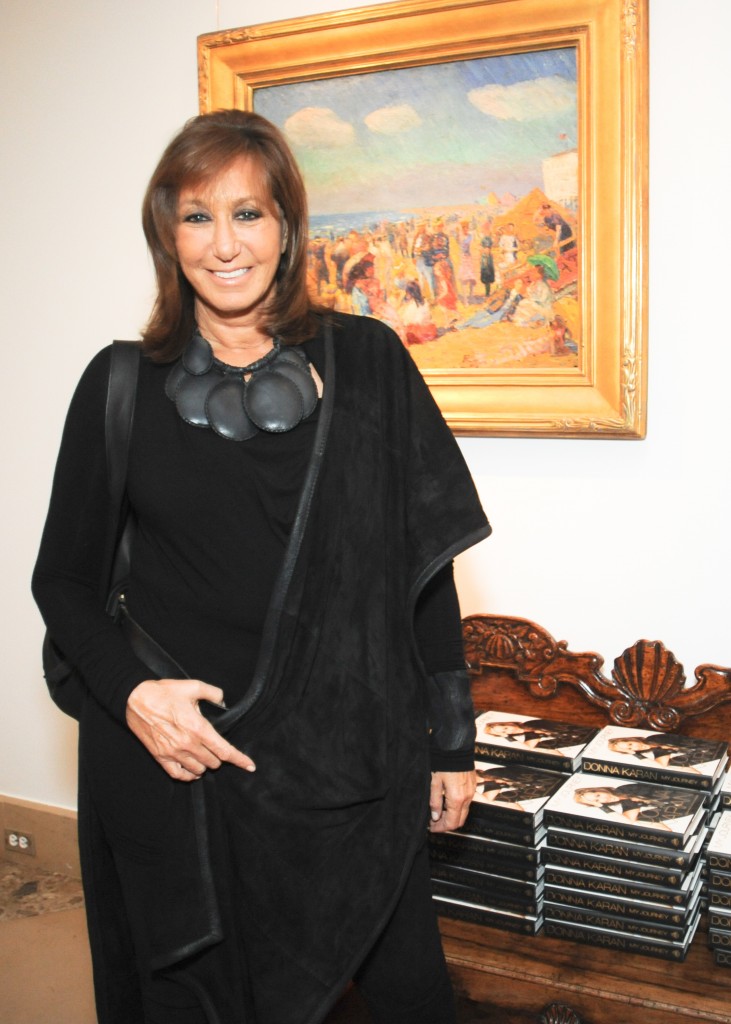Calling Donna Karan a force of nature in every possible way is stating the obvious.
To quote her bestie Barbra Streisand in the foreword to the designer’s book “My Journey” (Ballantine Books), Karan is at once “a designer, philanthropist, and visionary” and “the most scattered, disorganized human being you’ll ever meet.”
Streisand, like anyone who has ever had the privilege to spend time with Karan, says this with nothing but affection— because at her core, Karan is a nurturing soul in that Jewish mother way. A few years back, for example, during an interview on a Chelsea Piers bench, she artfully wrapped her cashmere scarf around my shoulders, sensing that I was woefully underdressed for the chilly winds coming off the Hudson River. I got to keep the luxury shmatta.
Karan’s chaos is also her creative engine and without it, there couldn’t be Donna Karan, the designer who became a fashion star with her groundbreaking concept of seven easy pieces in the 1980s.
Much has changed for the New York native in recent months. In late June, it emerged that she was leaving the brand that bears her name, and that the Donna Karan Collection – a pillar of New York Fashion Week for over three decades – was making way for the younger DKNY, now designed by Public School’s Dao-Yi Chow and Maxwell Osborne.
Karan admitted that it would probably take a year for her “to digest the whole thing,” but she isn’t using her newfound extra time to take a breather. She spent the past couple of months on a whirlwind tour to promote her book, and just last week, Streisand threw a shindig for her friend at Eric Buterbaugh Florals in West Hollywood.
This came after speaking engagements with the likes of Alina Cho and Sandra Bernhardt, a “Watch What Happens Live” moment with Andy Cohen, and more book signings that she probably cares to remember.
With “My Journey,” Karan tells the story of her life with refreshing – and inspiring – candor.
“I love the reflection, the looking back on my life, realizing the passion that I had, the love that I had, and the wonderful life I have lived,” Karan told CFDA.com. “And then there is the appreciation. When you get to be a certain age, you can’t believe so much has happened.”
During a career that spanned some four decades, she famously flunked in draping at Parsons, spent a decade at Anne Klein and launched her own label in 1984. Karan’s woman-to-woman ethos and system of dressing with seven easy pieces shifted the fashion needle. Along the way, she picked up many CFDA Awards, and spearheaded Seventh on Sale with Anna Wintour, galvanizing the American fashion industry in the fight against AIDS.
“Reliving all of it again has been a wonderful experience,” Karan said. “But at the same time, I am thinking, ‘Oh my god, what am I going to do next?’”
For a designer of Karan’s magnitude and drive, it’s a valid question, one that people seem to be asking her a lot these days. Anyone who knows Donna knows that this wasn’t the finale. Far from it. There will be enough material for a second and third book.
“This was absolutely not the last chapter, but in a way, that’s what scares me,” she admitted. “It was so easy to write the book and now I am looking at it and thinking, ‘What’s next?’ I will be designing Urban Zen, but every day, something happens. It’s the unexpected.”
Urban Zen, Karan’s “philosophy of living,” combines all of her passions, from humanitarian causes to philanthropy, to bringing together artisans from around the world, and giving back to communities through the Urban Zen Foundation. Its mission is to “to raise awareness and inspire change in the areas of Preservation of Cultures, Well-Being and Education.” Along the way, she touches on many Donna-isms from finding “the calm in the chaos of life” to a “connection of mind, body and spirit” to her quest to create a “soulful economy” that is “dresses people and addresses them” and is “about the We, not the Me.”
Urban Zen is on a growth trajectory. Karan recently opened the clothing line to wholesale, and showed the collection in Paris to international retailers. “The excitement for it has been incredible,” she said. “We are excited about new partnerships with new people. I didn’t expect it to take off the way it is. I like the intimacy of Urban Zen. Now that I have more time, I want to do more seminars on healthcare, education and culture. I want to recreate the community. I want to do what I have done in Haiti. I want to visit more countries. There were so many artisans all over the world I haven’t touched upon.”
Karan will reopen the Urban Zen Soulful Economy Marketplace at 711 Greenwich Street, which will sell her collection and work from artisans from around the world with a celebration with Parsons School of Design on Nov.19.
“To me, being a designer means to work with other designers, whether it is Robert Lee Morris or William Morris or artisans whose artwork inspires me,” she said. “I have so much work to do with Urban Zen.
“I am in a whirlwind,” she added. “Nothing has changed.”
And so the story continues.



